Should You Include Relevant Coursework on Your Resume?
What to include, how to list it, and when it is appropriate (with examples).
Work experience can be hard to come by when you’re a full-time student, and maybe you’ve only had an internship or two. You might be anxious that your resume is essentially a blank page.
So how can you show employers what you bring to the table?
One way to add relevant experience to your resume is to include relevant coursework. The college courses that you’ve taken can highlight your academic achievements, niche skillsets, knowledge in a certain area, or anything else that gives you an edge in your job search.
The relevant coursework section is optional for a reason, however: everything you list needs to be relevant to the role that you’re applying for. Listing random classes won't help hiring managers see that you’re the right fit for the job.
According to the Stanford Career Center, whether or not you add coursework "depends on the skills required, if by adding your coursework you are able to demonstrate that you have gained specific skills for that job, then it might be worth adding a few courses."
Here are some tips to help you decide whether you need a resume section for your relevant coursework, or if there is a better way to show potential employers why they want to hire you.
Formatting Your Resume Like a Pro
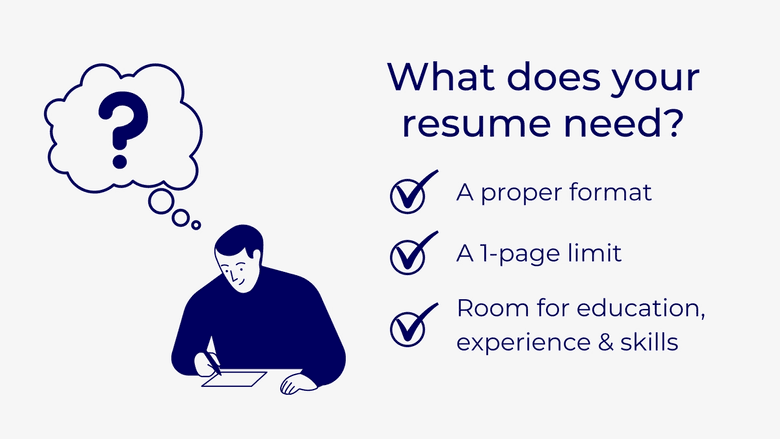
The first thing you need to do is think about how to format the rest of your resume. Relevant coursework can be a valuable addition, but you need to position it correctly with the rest of your experience. Websites like Canva provide a variety of resume templates that you can use to start.
First of all, it's essential to note: an entry-level resume should be exactly a page long, no more, no less. This shows off a variety of experience and helps potential employers read it quickly and easily.
Within that page, you need to include multiple sections including education, experience, skills, and volunteer work/extracurriculars.
With so many potential sections, where does relevant coursework fit in?
Tricks to Make Your Education Section Shine
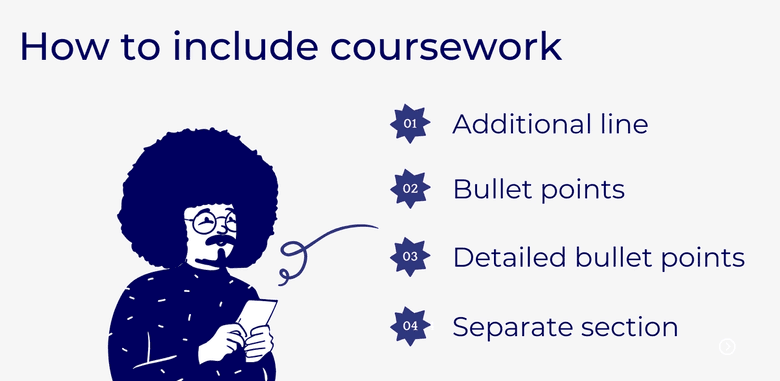
For most folks, the education section of your resume includes your degree (Bachelor of Arts, Bachelor of Science, etc) and GPA. Depending on how you choose to format, it may encompass research projects, awards, academic achievements, or even extracurricular activities and volunteer experience.
If you choose to include relevant coursework in your resume, it also belongs in the education section. There are several options when formatting your relevant coursework section, but make sure that it’s a clearly labeled subsection listed below your degree.
Option 1: Additional Line
Beneath your degree, make a list of courses that you think best represent your knowledge and expertise as related to the job description. Here’s an example:

Option 2: Bullet points
If you have more space available on your resume, you can make your relevant coursework section more impactful by spacing out the courses in a bullet point list.

Option 3: Detailed bullet points
You can go the extra step and add descriptions of each course to your bulleted list. This is a good option if the course titles don’t make the content of the course clear. You can use descriptions to show how the courses are applicable to the job.
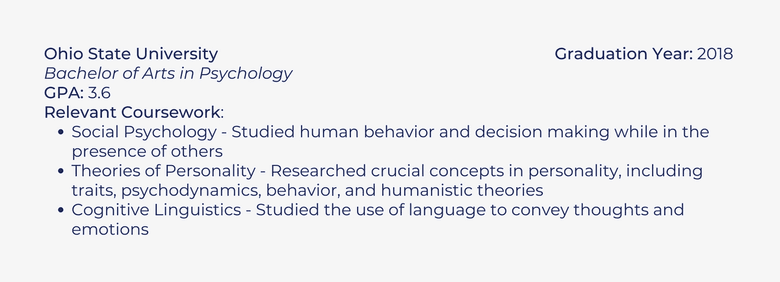
Option 4: A separate section
If the position you want requires a particularly strong academic focus, you can create an entirely separate section just for your related coursework, so you can go into even greater detail. However, this will not be necessary for most positions.
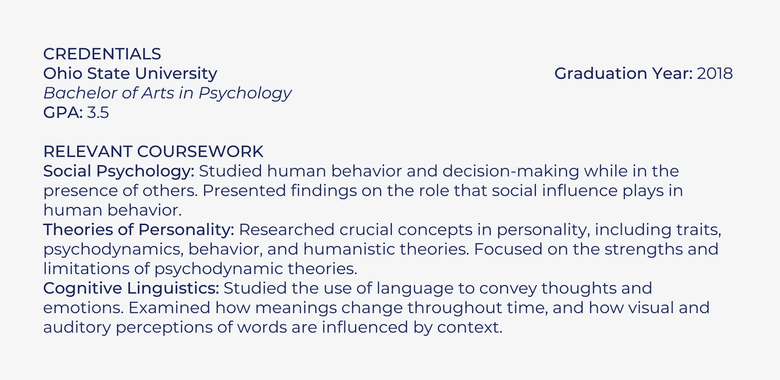
The Only Things to Include in Your Relevant Coursework Section

If you choose to add relevant coursework, the courses should always be applicable for the position. If you’re applying for a job in software engineering, a recruiter probably won’t care about your biology classes. However, they definitely want to know what programming languages you're proficient in what domain expertise you have. Even if you haven’t had work experience in the field yet, your computer science classes probably provided a solid foundation.
Pay close attention to the job description: what hard skills or unique experiences are they looking for? How do your courses relate?
The job description may provide other queues about how to tailor your education section. They may be looking for a specific certification that you'll need an online course to fulfill. Or, they may require a specific GPA or degree type, which could make or break your chances of getting the job. Knowing that a potential employer cares about your GPA is also a good way to gauge if they care about your college courses.
When to Include a Relevant Coursework Section
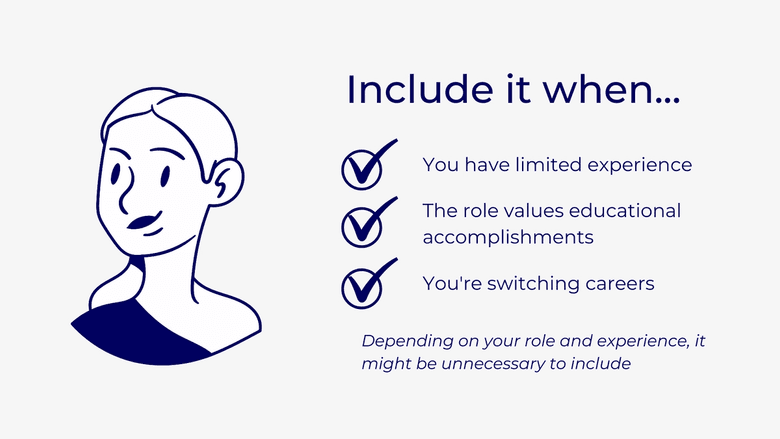
✅ When including the section is a good idea...
There are some circumstances when adding relevant coursework to your resume is a great idea. Here are a few:
- When you have limited work experience. This is especially applicable if you are a college student or a recent high school graduate. Adding relevant coursework allows you to showcase knowledge and skillsets that a recruiter wouldn’t see in your work experience.
- For jobs that place a higher value on educational accomplishments. Some roles are more interested in your academic expertise (and the papers, projects, and awards that come along with it) than your hands-on experience.
- When you're switching careers. If you've taken online courses (or even recent college courses) that relate to your new role, include them! Show potential employers that you're dedicated to learning about the field.
❌ When including the section is unnecessary...
Although it may not be harmful, there are a lot of times when including classes is just unnecessary. Here are a few:
- When you have a lot of experience. If you’ve had several jobs or internships’ worth of relevant work experience, then you probably don’t need to include college courses unless they’re strongly related to the role. At that point in your career, you have professional experiences and achievements that you can point to instead. Highlight a work project or initiative rather than a school project, as it will likely be more relevant.
- For jobs that won't take it into account. Some companies don't find coursework helpful in the hiring process, or don't take it into account (example: retail and food service jobs)
- When it's unrelated to your career path. You might have a degree in an area that doesn’t intersect with your current career path, in which case your professional experience will be far more important to include.
Main Takeaways
Including relevant coursework on your resume is entirely optional, but it can be a welcome addition to a resume when it’s, keyword, relevant.
When applying to jobs, dedicate time and attention to each section of your resume in order of importance. If you choose to include a relevant coursework subsection, make sure you’re tailoring it to each job you apply for.
If you think your college courses are the key to getting hired, then make the section prominent. If not, then be sure to add other sections to your resume to showcase your skillset and expertise.
👉 Read Next: How far back should your resume go?
The information provided herein is for general informational purposes only and is not intended to provide tax, legal, or investment advice and should not be construed as an offer to sell, a solicitation of an offer to buy, or a recommendation of any security by Candor, its employees and affiliates, or any third-party. Any expressions of opinion or assumptions are for illustrative purposes only and are subject to change without notice. Past performance is not a guarantee of future results and the opinions presented herein should not be viewed as an indicator of future performance. Investing in securities involves risk. Loss of principal is possible.
Third-party data has been obtained from sources we believe to be reliable; however, its accuracy, completeness, or reliability cannot be guaranteed. Candor does not receive compensation to promote or discuss any particular Company; however, Candor, its employees and affiliates, and/or its clients may hold positions in securities of the Companies discussed.
